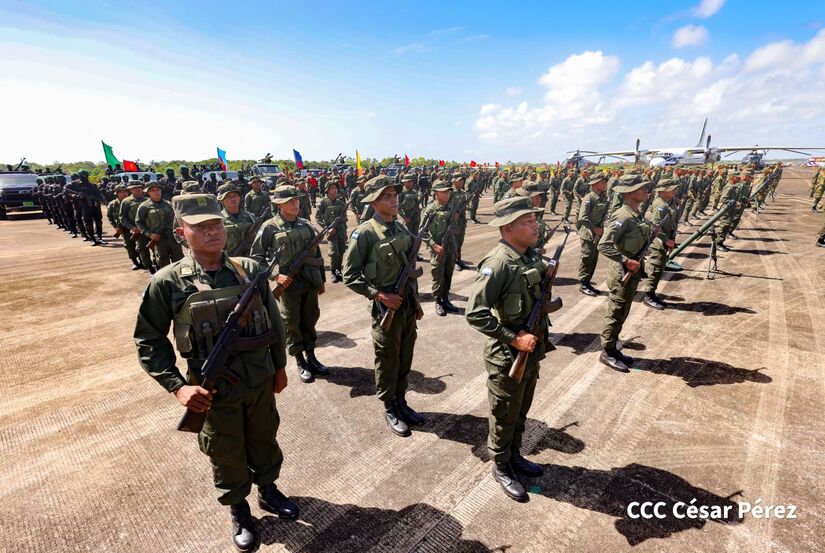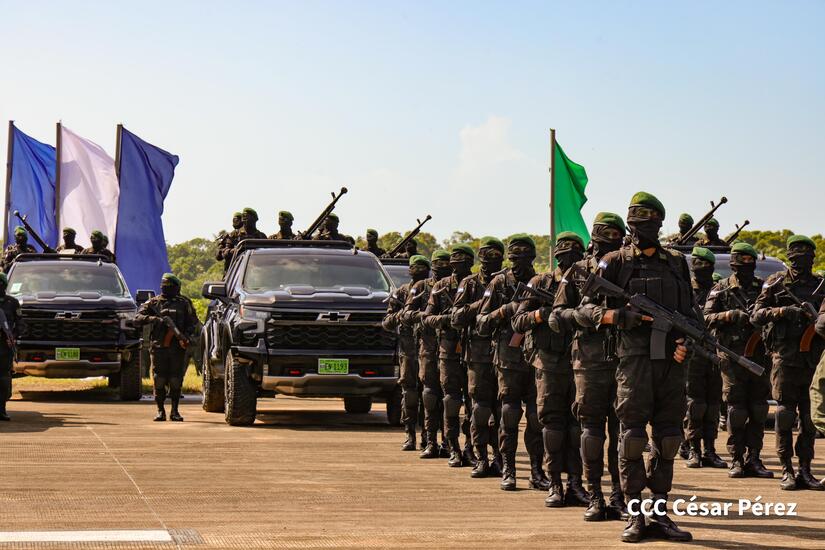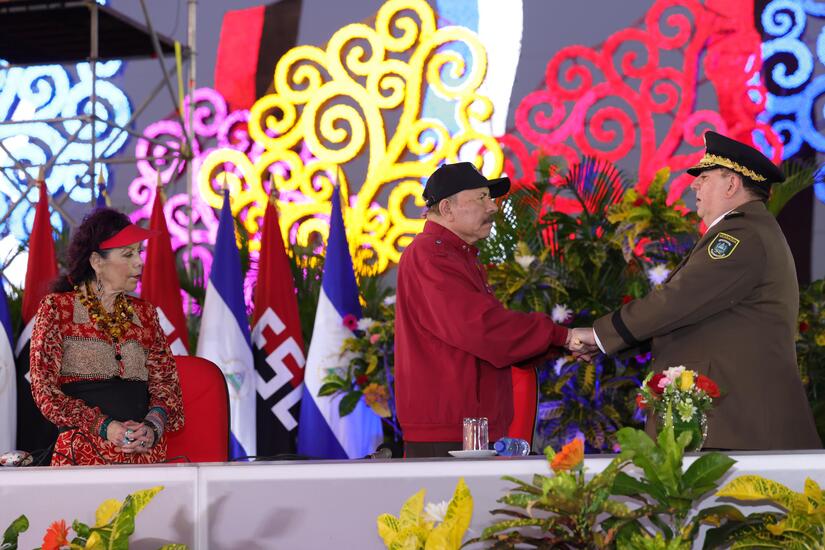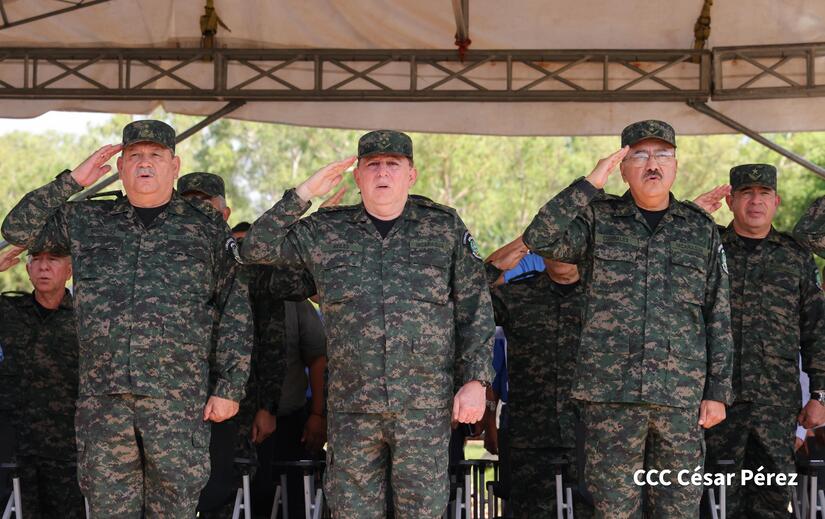The United Nations (UN) Group of Human Rights Experts on Nicaragua (GHREN) reported for the first time that it obtained credible information indicating that the Nicaraguan Army participated in the repression of Nicaraguan citizens during the 2018 protests, using lethal weapons in coordination with the National Police and pro-government armed groups.
According to this information, on April 20, 2018, two days after the start of the mass protests against the Ortega-Murillo regime, a meeting took place with active-duty officers from the Special Operations Command and the Directorates of Doctrine and Training, Military Intelligence, and Personnel. During the meeting, it was claimed that they were “facing a coup d’état orchestrated by social organizations.”
The Chief of the General Staff of the Nicaraguan Army, Bayardo Rodríguez, read a presidential order instructing the heads of various military units to “neutralize” those involved in the demonstrations.
In the report published on Wednesday, February 26, GHREN established that Ortega and Murillo ordered the National Police, the National Army, and pro-government armed groups “to violently repress the demonstrations as part of a strategy designed to maintain power at all costs.”
The UN Group of Experts noted that the military used specialized weapons and snipers to suppress the 2018 protests.

The Intention Was to Kill and Instill Fear in the Population
Nicaraguan Army Commander-in-Chief Julio César Avilés ordered the military to take part in suppressing the protests, despite having no authority over public security and knowing full well that their involvement could lead to loss of life.
“The documented extrajudicial killings were the result of coordinated actions between the Police, the Army, and pro-government armed groups,” the report states.
The experts explained that “the systematic and deliberate use of lethal weapons, some reserved exclusively for military use, the intervention of snipers, combat tactics designed to kill rather than control crowds, and the high number of victims with gunshot wounds in vital areas of the body suggest that their intention was not to disperse the protesters but to kill them and instill fear in the population.”
The Group determined that the Army actively participated in the repression of the protests, provided weapons to the Police and pro-government armed groups, conducted intelligence operations, and trained civilian personnel, including members of the Sandinista Youth, marginalized youths, and public officials.
Use of Specialized Weapons and Snipers
The document states that the Army’s Defense Information Directorate took operational control of the repression of the demonstrations, coordinating with the Military Intelligence and Counterintelligence Directorate, the Police Intelligence Directorate, the Army’s Special Operations Command, and the Police Special Operations Directorate.
“Members of the last two groups used specialized weapons and snipers during their interventions. Military commands and regional detachments, the Ecological Battalion, and the Special Operations Command deployed military personnel dressed in police uniforms or civilian clothing to support the police and pro-government armed groups on the ground,” the report highlights.
GHREN now has reasonable grounds to believe that, alongside the National Police and pro-government armed groups, the Army committed extrajudicial killings during the mass protests of 2018.
The Army has repeatedly stated publicly that its role during the 2018 crisis was limited to protecting strategic assets and has denied its involvement in the repression. However, over the years, the institution, including its General Command, has been shown to be subservient to the Ortega-Murillo regime.
Military personnel have also been accused of participating in arbitrary detentions in 2018, the expulsion of Nicaraguans, and the revocation of citizenship from opposition figures or those perceived as such.

Sanctioned Generals
The international community has sanctioned the Army’s two highest-ranking officers for their collaboration with the ruling couple: Julio César Avilés, Commander-in-Chief, and Bayardo Rodríguez, Chief of General Staff. Additionally, sanctions have targeted the economic arm of this military institution, the Military Social Security Institute (IPSM).
All members of the IPSM Board of Directors—except Marvin Corrales—have been sanctioned by the U.S. Department of the Treasury.
On Friday, February 21, General Julio César Avilés was sworn in for his fourth consecutive term as head of the Army. With this new 2025-2031 mandate, Avilés will have served 21 years in the position he first assumed in 2010—an unprecedented tenure in Nicaragua’s recent history.
During the swearing-in ceremony, Avilés thanked Ortega for his support and assured him of “the firm determination of all to continue contributing to the construction of a free, dignified, just, and prosperous Nicaragua that we all deserve.”
Avilés is also on a list of 15 members of the Ortega-Murillo regime submitted to Interpol by an Argentine judge for arrest, as part of a case in Argentina alleging “systematic human rights violations” under the principle of universal jurisdiction, which allows countries to prosecute crimes against humanity regardless of where they were committed.
Avilés has repeatedly claimed that the Army has been the target of smear campaigns by the opposition and has defended the political violence that underpins the Sandinista dictatorship.
Extensive Surveillance and Intelligence Network
In this regard, GHREN provides new insights. The experts identified the existence of a vast surveillance and intelligence structure that operates under the orders of Ortega and Murillo.
This structure is mainly composed of members of the National Army, the National Police, the Ministry of the Interior, the Nicaraguan Institute of Telecommunications and Postal Services (Telcor), the Ministry of Health, and pro-government armed groups. It operates through computer centers installed in every municipality.
The government uses this information—primarily channeled through the Police Intelligence and Information Center, the National Information Committee, the Financial Analysis Unit, and the Sandinista Front’s structure—to identify opposition figures, monitor their activities, harass them, or track their location. This structure also determines who should be detained, expelled, prevented from returning, or arbitrarily stripped of citizenship.
The document explains that prosecutors, judges, and public defenders worked in coordination with the National Police, the National Army, and the intelligence network to systematically detain and criminalize protesters and other real or perceived opponents.
The Army also engages in political surveillance through its Defense Information Directorate, in coordination with the Sandinista Victory Units—neighborhood-level structures—political secretaries, the leadership of the ruling Sandinista Front, and the Police intelligence services.
“This intelligence and control network has infiltrated all levels of society, from neighborhoods to municipal offices, departmental governments, and ministerial delegations,” the experts note.

Experts Prepare List of Perpetrators of Violations and Crimes
Military personnel are accused of participating in arbitrary detentions in 2018, the expulsion of Nicaraguans, and the revocation of citizenship from opposition figures or those perceived as such.
The head of the Defense Information Directorate, Rigoberto Balladares Sandoval, and his members were dedicated to the political surveillance of government critics. “This Directorate exchanged intelligence with high-ranking FSLN members and the Police Intelligence Directorate to identify individuals for expulsion,” the experts emphasize.
The Group also documented that members of the IV Regional Military Command participated in at least five expulsions through land border crossings with Costa Rica in coordination with the Police.
Since its establishment in March 2022, GHREN has sent 16 requests for information to Nicaraguan authorities, none of which have been answered. A copy of this report was also sent to the Ortega-Murillo regime.
GHREN announced that it is preparing a forthcoming document with detailed conclusions on the structure and organization of the state’s repressive apparatus, identifying those responsible for violations and crimes. These names will be transmitted to the Nicaraguan government and the implicated individuals for a response.





